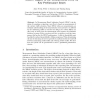Free Online Productivity Tools
i2Speak
i2Symbol
i2OCR
iTex2Img
iWeb2Print
iWeb2Shot
i2Type
iPdf2Split
iPdf2Merge
i2Bopomofo
i2Arabic
i2Style
i2Image
i2PDF
iLatex2Rtf
Sci2ools
111
Voted
IFIP
2010
Springer
2010
Springer
MBAC: Impact of the Measurement Error on Key Performance Issues
Abstract. In Measurement Based Admission Control (MBAC), the decision of accepting or rejecting a new ow is based on measurements of the current trac situation. Since MBAC relies on measurements, an in-depth understanding of the measurement error and how it is aected by the underlying trac is vital for the design of a robust MBAC. In this work, we study how the measurement error impacts the admission decision, in terms of false rejections and false acceptances, and the consequence this has for the MBAC performance. A slack in bandwidth must be added to reduce the probability of false acceptance. When determining the size of this slack, the service provider is confronted with the trade-o between maximizing useful trac and reducing useless trac. We show how the system can be provisioned to meet a predened performance criteria.
| Added | 13 Feb 2011 |
| Updated | 13 Feb 2011 |
| Type | Journal |
| Year | 2010 |
| Where | IFIP |
| Authors | Anne Nevin, Peder J. Emstad, Yuming Jiang |
Comments (0)

